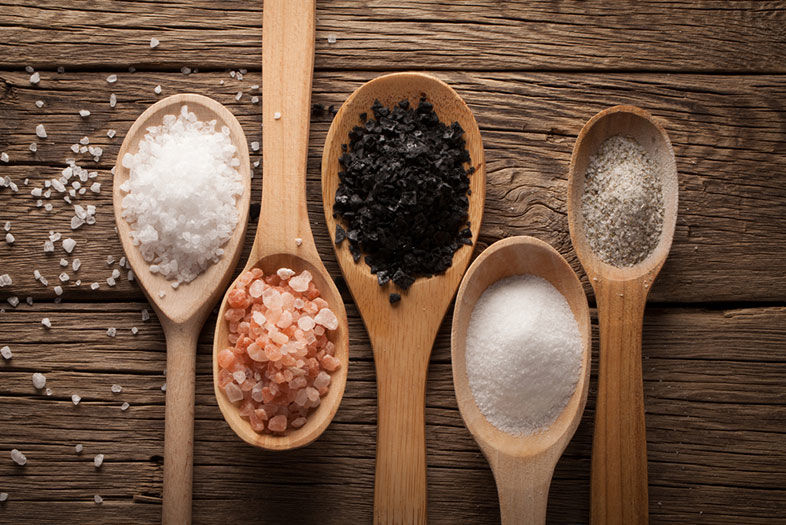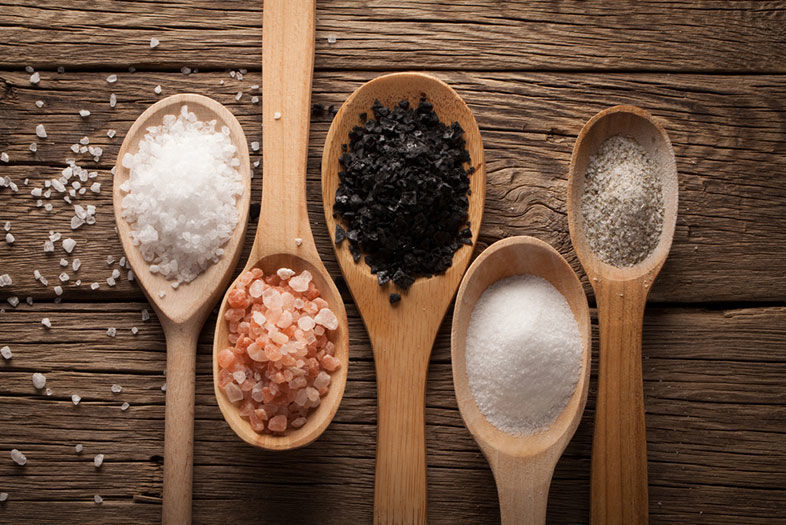This is the third part in a serious, earth-shattering discussion about where the heck salt and pepper have gone in restaurants. Why are they not on our tables anymore? You can read the first part here and the second part here.
“If you look at it akin to listening to music, you still enjoy the work of the artist, producer and engineer, but utilize your stereo EQ to make it perfect for your tastes.”
Dryw Keltz, San Diego
We used to not question professionals. If the doctor said we had six months to live, we went skydiving, did heroin in the middle of a Manhattan subway train, and finalized the will. If the mechanic said we needed a new transmission, we sold our least favorite child to buy a new one. And if a restaurant chef told us the food was as good as it could possibly get, we just slogged on and ate that saltless chicken, shamefully dreaming of the Hot Pocket in our freezer at home.
We’ve watched thousands of hours of Food Network now. We’ve created Pinterest boards dedicated to tartines and arcane micro-desserts from Zimbabwe. We even tried durian once, and it tasted like the bad part of biology.
As is human nature, we’ve tended to overestimate our new knowledge. We’ve granted ourselves honorary master’s degrees in gastronomy. With Yelp and TripAdvisor and other places we can register our opinions for millions of others, we’ve become a nation of critics. And to assume the chef has seasoned our food perfectly is to grant them unchecked dominance over our evolving critical function.
“Not so fast, sir or ma’am chef,” we say. “I’ll tell if you salted judiciously or drastically missed the pleasure center of my mouth.”
So now we come to restaurant chefs not so much as fans, but as peers. Of course, our presumed peerness is almost always overstated, since most chefs’ knowledge far surpasses mine or yours. But it doesn’t matter. We think we know.
That’s not to say that we are going to dinner looking to have beef with the chef. We’re not going to dinner to poke holes in America’s pleasure-giving industries. What turds would we be if that was our intent? (Actually, looking at some of the scathing, peripatetic, curse-word-laden reviews online, some of us are.)
And that’s why we’re a little offended that salt and pepper have disappeared from the restaurant table. Our tiny bit of control on tonight’s meal has been unceremoniously taken from us in the dark of night.
I posted this question to friends on Facebook: What do you think about salt and pepper not being included on restaurant tables?
Many in my social media circle are chefs, food people, or food fans, and the response was pretty resounding: Like Mel Gibson in that movie where he yells into the phone to give him back his son, they are screaming at chefs to give us back our salt. (Granted, we’re asking for Himalayan sea salt, not the paltry crap, as described in the first part of this series, because we’re highly tuned tasting machines in a post-food-revolution world now).
Many of the people who responded took S&P’s disappearance as proof that chef egos have gotten out of control. How does any chef, no matter experience or talent or super-palate, know the desires of our own mouth? Does he also know how I like to be held? Does he or she intuit my love language?
Some of the choice responses:
- Gary Newman: “Taste is subjective, arrogance of a chef shouldn’t be.”
- Erin Duggins Ramage: “That’s why I sit at the bar. You can adjust anything with what is behind a good bar.”
- Dave Dennis: “Different palates have different needs when it comes to savory sensibilities… It would be nice for diners to have the option to add a dash of spice here and there.”
- Greg Gorelick: “Not making considerations for the tastes and experiences of the customers is bad business.”
- Samuel Hornedo: “When a restaurant/chef decides to put their ego above their patrons’ wish for a more pleasurable taste experience, then that’s a recipe for losing customers. People’s palates vary and therefore will interpret taste differently. Some will choose to add salt as a flavor enhancer, some will be satisfied with the flavors created by the chef. It’s better to have the option to make the flavor to one’s liking.”
- Jason Zeigler: “I’m a bit of a picky eater. Certain things I eat I want seasoned a specific way. I don’t want to be ‘that guy’ when I go out to eat, so I just don’t go out as often or don’t necessarily order what I really want. If I had the option of seasoning to my tastes I would eat out more often and have a much more enjoyable experience.”
- Aimee Noble: “Vietnamese cuisine has this locked down: fresh herbs, lime, soy sauce, sprouts for texture, onion for zing, sambal, chili oil… all are available with no qualms from the chef. I definitely think appropriating a little of this in traditional American cuisine could go a long way!”
- Sharon J Corrigan: “I agree that tastes/palate changes as we season (what you may call age). My experience is that I need more seasoning now than when I was young, to be able to taste it. Don’t assume your palate and your guests are the same. That being said, I have seldom found it necessary to add salt or pepper. But often ask for hot sauces.”
- Luca Paris, chef: “Salt and pepper are a must to be available to guests. It is their experience and if they want more they should have it.”
- Tim Mays, restaurant owner: “Always want the option to add salt and/or pepper. Put it on the table.”
- Dana Ralston, produce broker: “Bring ‘em back. Don’t put my palate in a box!”
- Andy Cisneros: “I say they need to start putting an array of seasoning for the patrons’ discretion. Have a damn spice rack on the table, who knows, it could do wonders!”
- Kevin Moto: “There’s also cultural differences in palates, of course. My Asian friends love them some salt and spice!”
- Patrick C Sheehy: “I’m a big boy and Michelin stars or no, I can decide if I need a little salt or some pepper.”
- Sheri Packin Rosenberg, account exec at US Foods: “I don’t think a chef should be insulted by any means. Just because it is on the table doesn’t mean you would use it. Upscale restaurants can use artesian salts and peppers if they want to upscale it and show it off in fancy salt and pepper shakers or pretty little soufflé dishes. If a shack on the beach can…why not all restaurants?”
- George Morris, chef: “It depends on the type of place. If you have a Michelin star or are the top-rated restaurant in your city, no. If you are an Asian or Latino joint where heat and condiments are part of the experience, then yes. If you just are a ‘good’ restaurant, then yes. Get that shit on the table. If your food isn’t amazing, and you don’t provide s and p, you should probably go play in traffic.”
Is the chef’s palate the same as ours? Don’t tastes vary from human to human, mouth to mouth? Maybe the chef is a smoker, and tends to over-salt food because Marlboro has atom-bombed his taste buds. Maybe the chef is younger and her taste buds are still bright fresh flowers of receptivity, while we’re older and more fatigued in the mouth, and thus need more salt to stimulate our dulled flavor harbors.
I know one thing about myself when it comes to chicken. I love it over-salted. Excessively salted. It doesn’t matter how highly seasoned chicken is, I find something magical about an obscenely extra sprinkle of sea salt on a roasted bird. There are very few chefs, or humans, who would season a bird as heavily as I do. It’s my weirdness, and no restaurant kitchen could intuit that weirdness. In fact, if they rightly guessed how much salt I like on bird, I’d be embarrassed for us both.
So, if all palates are different and there is no “perfect seasoning,” presenting diners with the option to season seems like a small, polite gesture.
Give us back our (pink, Himalayan, designer) salt! Give us back our pepper!
Even better, how about some lemon juice or sumac or more inspiring seasonings? Why not take a page from Vietnamese pho restaurants, which include Thai basil and lime and jalapenos and hoisin and chili paste at our tables so that we can season and herb as we please?
What about adding it as an optional menu item? Seasoning: $1.
Next in this series, we’ll explore a few of the other reasons salt and pepper have gone the way of the Slinky. Namely, people steal salt and pepper shakers. Some punk kids, who probably skateboard too often, will loosen the lids on the salt shakers as a prank. And some restaurants feel that S&P on a table makes them look like Denny’s.

PARTNER CONTENT
Give Us Back Our (Pink, Himalayan) Salt and Pepper



















